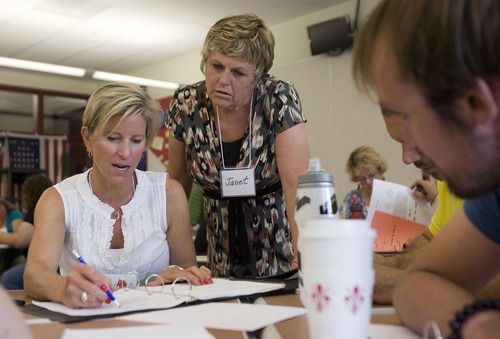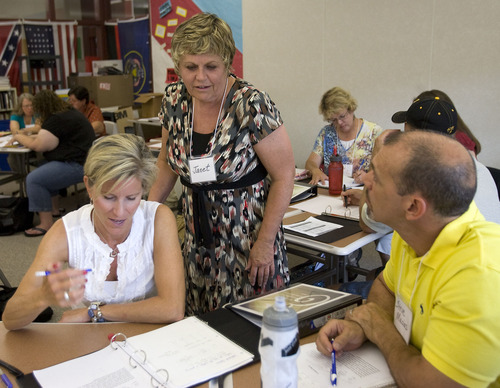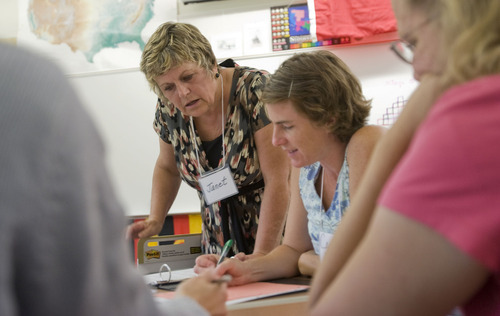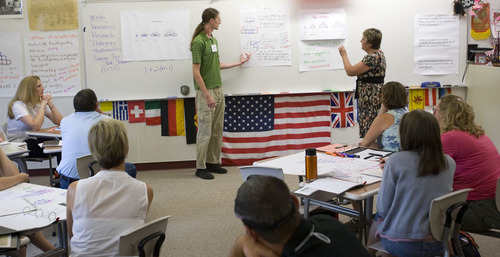This is an archived article that was published on sltrib.com in 2011, and information in the article may be outdated. It is provided only for personal research purposes and may not be reprinted.
When it comes to math instruction, some things seem to never change: Two plus two equals four; A² + B² = C²; first comes algebra, then geometry.
Well, except that last one.
Parents of ninth-graders will notice a dramatic change as their children return to school this year: geometry and algebra will no longer be taught separately in most Utah schools. The majority of Utah ninth-graders will no longer take Algebra I, instead taking a new class called Secondary Mathematics 1, which combines elements of algebra and geometry. The switch this fall is the first part of a gradual phase-in of Common Core State Standards, new academic standards that will change what students in each grade are expected to learn in math and language arts in hopes of better preparing them for college and careers.
The idea behind the new math courses is to integrate mathematical concepts to better reflect how math is used in everyday life. Teachers will also change the way they instruct students, asking them to think more about problem solving and real world applications rather than just mimicking a process to reach an answer.
"It's a big change," said Brenda Hales, state associate superintendent. "It goes into fewer concepts, in-depth, and it takes concepts, like for example, algebra and geometry, and teaches some of the concepts together because they apply together and are actually used together."
Utah is one of 46 states and territories that have adopted the Common Core standards, which were developed as part of a states-led initiative. All the math and language arts changes will be fully in place in Utah by 2015, kicked off by the changes this year.
The other changes will be phased in over time. For example, this year's ninth-graders will take Secondary Mathematics 2 as 10th- graders next year and then Secondary Mathematics 3 as 11th-graders. By the time they're seniors, students will be ready to take precalculus, Advanced Placement statistics or concurrent enrollment classes. Honors versions of the secondary mathematics classes will also be offered, and students who take those honors courses will be ready for Advanced Placement calculus as seniors.
To graduate from high school, Utah students will continue to be required to take at least three years of math. Sixth-grade math will also change this year, becoming more rigorous and leading to later changes in seventh- and eighth-grade math. The Alpine District is the only district in the state that will hold off on the ninth- and sixth-grade changes for a year to give their teachers more training, Hales said.
Many Utah educators say they're excited about the new classes.
"What you're going to be able to do is show how they all relate," said Bill Berneau, assistant principal at Hillcrest Junior High in Murray. "Now we're going to be able to take these concepts and say, 'Here's how geometry ties into algebra.' "
Some teachers are especially enthusiastic about the new methods, intended to better engage students.
"I think we've needed this," said Janet Sutorius, a Juab High math teacher and winner of the prestigious Presidential Award for Excellence in Mathematics Teaching in 2010. "This method has students thinking. In the past it was more about students copying what the teachers did."
Sutorius worked as a state facilitator at training sessions held across Utah this summer to prepare educators to teach the new classes. About 6,200 Utah teachers of math and language arts gathered at the training sessions. Those who attended will help train teachers at their schools.
Cami Perkes, a ninth-grade math teacher at West High in Salt Lake City who attended one of the training sessions, acknowledged that it will be a lot of work for teachers to get comfortable leading the new classes and may involve making many photocopies because most textbooks don't yet match the new curriculum. However, schools will have access to online textbooks and open source materials that are free and available to everyone, Hales said.
But Perkes said it will help that the material isn't new; it's just the way it's put together that's changing.
She said she's happy the new classes will feature "more of an emphasis on creating realistic math models that fit the real world rather than just solving equations."
But perhaps one of the biggest changes will be the mental shift for parents, who likely took algebra and geometry separately when they were in school and expected their kids would do the same.
Lisa Devashrayee, chairwoman of the school community council at Butler Middle School in Cottonwood Heights, said she has mixed feelings about the change. She worries that her son, who is going into ninth grade, might end up repeating concepts when he takes Secondary Mathematics 1 honors this year. An advanced student, he's already taken Algebra I and geometry.
Hales said the honors version of Secondary Mathematics 1 is a rigorous course about more than just algebra and geometry, and very advanced students also can always take a later class if they've already progressed to a certain level.
Still, Devashrayee is concerned. "He's going to be relearning what he's already learned even in the honors course," she said. At the same time, she is excited her two younger children will get to take the Common Core classes.
"For my younger two kids it will be great because that way they're all learning the same concepts but learning them more in depth," she said.
Kelli Buxton, former Parent-Teacher-Student Association president at Brighton High in Cottonwood Heights, said she thinks the new classes will better prepare kids to take the ACT because they'll build on the same concepts from year to year.
She said, if anything, she only wishes the changes had happened sooner so her children who have already graduated from high school could have benefitted, though she has a child entering fifth grade this year.
"It frustrates me it's taken so long for us to get to this point," Buxton said. "I feel like my other two children have missed out."
How will Common Core change math instruction?
Common Core State Standards will change what students in each grade are expected to learn in math and language arts to better prepare them for college and careers. Full implementation in Utah is expected by 2015. Many say the changes will improve education.
For example, under Utah's current requirements, first-graders are supposed to be able to tell time in hours and half hours, but they're only required to learn how to add and subtract through 20. Under the new standards, first-graders will have to know how to add and subtract larger numbers, which will help them be better able to tell time in hours and half hours. —
School bells
P Most large school districts in Utah begin classes this week:
Monday • Canyons, Davis, Granite, Provo
Tuesday • Alpine, Weber, Tooele
Wednesday • Logan, Ogden, Park City, Salt Lake









